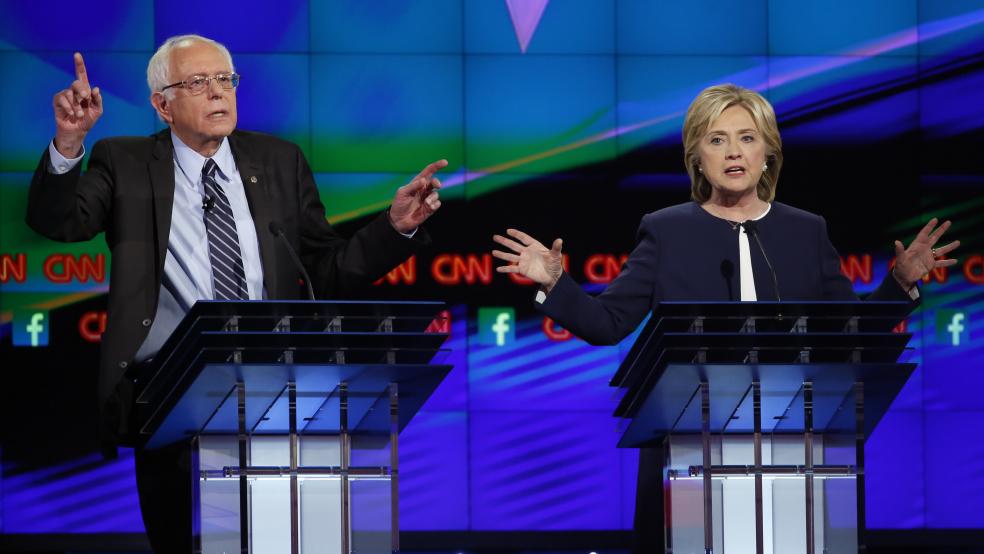For many Americans, the entrance of Sen. Bernie Sanders (I-VT) into the 2016 presidential race was the first time since college that they’ve thought much, if at all, about the word “socialism.” It describes the stage between capitalism and communism where the state owns and runs all of a country’s businesses — and back at the turn of the 20th century, the United States actually had a Socialist Party led by Eugene V. Debs. While it may be hard to imagine our country embracing the idea of the same government that runs the IRS, post office and other dysfunctional organizations taking over all private businesses, we seem to be moving in that direction.
We’re currently at a stage between capitalism and socialism that might be called “regulism.”
Related: What the U.S. Must Do to Avoid Another Financial Crisis
Regulism is characterized not by the state owning firms but rather by the state making all of the key decisions for firms. The most obvious example includes firms that have been designated by regulators as “too big to fail.” After the 2008 meltdown, the Dodd Frank financial reform law allowed the Federal Reserve to designate large non-bank firms as “systemically important” and, along with banks having more than $50 billion in assets, put them under the control of a government oversight panel, the Financial Stability Oversight Council (FSOC). The law allows this FSOC to exercise “tough new supervision” to help minimize the risk these firms take, and it can even play a role in breaking up firms.
This is the most obvious face of regulism — but far from the only one. In the energy field, the federal government is deciding through regulations and subsidies which companies get to continue operations. These decisions are not made based on the efficiency of the firms, but by regulatory bureaucrats and successful lobbying for subsidies by favored firms. Coal is being slowly regulated out of business (enough power to provide electricity to 45 million homes has been lost recently) while wind and solar companies are getting subsidies that allow them to continue, no matter how inefficient they are.
Related: Which States Get Hit Hardest by Obama’s New Energy Rule?
How about companies that make cars and trucks? No matter what consumers and businesses want in terms of fuel economy, the federal government has decided (via the Corporate Average Fuel Economy or CAFE regulations) to set the standards, doubling them from 27.5 mpg in 1985 to 54.5 mpg for cars and light trucks by 2025.
What is not considered in these decisions are the tradeoffs companies must make. One way for car manufacturers to reach the CAFE standards is by making vehicles smaller and lighter, which means they will be much less safe. When a car is hit by a vehicle that’s 1,000 pounds heavier, the probability of dying in the smaller vehicle increases by 47 percent. While car companies used to design cars based on consumer surveys and information, now the first decision is how it will affect its compliance with CAFE. Again, government is making the decisions for private companies.
Regulism even affects teaching. In a survey of 2,000 education officials as to which federal regulations from the Higher Education Act from the Department of Education are too burdensome, the answer was: “Almost all of them.” For example, 96 percent of office administrators said that the information they’re asked to provide the federal government on music downloading could be eliminated or modified.
Related: 11 Ridiculous Reasons Children Got Suspended From School
For the first time in our history, more small firms are closing than are opening. Regulism is one of the reasons. As one trade organization member put it, “The stifling effect of regulatory burden, complexity, and uncertainty is particularly acute for new businesses.”
In an economy that is based primarily on capitalism, when firms close, it’s because they aren’t efficient, they don’t keep costs under control or they fail to meet the needs of customers. But in an economy characterized by regulism, with the government making the key decisions, it’s just as likely caused by government decisions as by poor business practices. No one knows.
Related: U.S. Companies Are Dying Faster Than Ever
In socialism, when firms fail, everyone knows it’s the government’s fault because they run the business. In an economy run by regulators, no one ever knows if it’s the government’s fault. As long as government regulators escape scrutiny for their bad performance, they can continue to drive the economy into the ground with no one being the wiser.
— Richard Williams is vice president for policy research with the Mercatus Center at George Mason University and director of its regulatory studies program.




